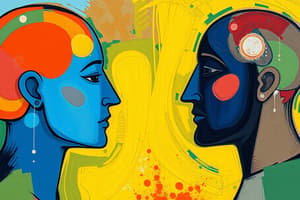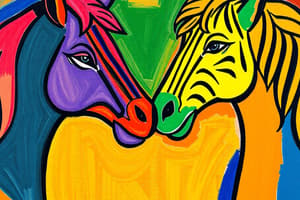Podcast
Questions and Answers
What is learning?
What is learning?
- The ability to recall past events
- A temporary change in behavior
- The process of acquiring new and relatively enduring information or behaviors (correct)
- Only memorizing information
What is associative learning?
What is associative learning?
The process of learning that certain events occur together.
What is classical conditioning?
What is classical conditioning?
The learning process in which we learn to associate two or more stimuli.
What is operant conditioning?
What is operant conditioning?
What is cognitive learning?
What is cognitive learning?
What is a conditioned stimulus?
What is a conditioned stimulus?
What is spontaneous recovery?
What is spontaneous recovery?
What is generalization in classical conditioning?
What is generalization in classical conditioning?
What is discrimination in the context of classical conditioning?
What is discrimination in the context of classical conditioning?
What did Ivan Pavlov contribute to psychology?
What did Ivan Pavlov contribute to psychology?
What is taste aversion?
What is taste aversion?
What is the law of effect?
What is the law of effect?
What is self-control?
What is self-control?
What does biological influence refer to?
What does biological influence refer to?
What is the difference between fixed-ratio and variable-ratio reinforcement?
What is the difference between fixed-ratio and variable-ratio reinforcement?
What is negative reinforcement?
What is negative reinforcement?
What impact does observational learning have?
What impact does observational learning have?
What is intrinsic motivation?
What is intrinsic motivation?
What is the effect of overjustification?
What is the effect of overjustification?
Flashcards are hidden until you start studying
Study Notes
Learning and Types of Conditioning
- Learning encompasses the acquisition of new and lasting information or behaviors.
- Associative learning involves understanding that certain events occur together.
- Classical conditioning entails associating two or more stimuli, leading to an automatic response.
- Operant conditioning connects behavior with its consequences, highlighting the importance of reactions to actions.
Key Concepts in Classical Conditioning
- Unconditioned Response is a natural reaction (e.g., salivation) to an unconditioned stimulus (e.g., food).
- Unconditioned Stimulus automatically triggers a response without prior learning.
- Conditioned Stimulus becomes associated with an unconditioned stimulus to elicit a conditioned response.
- Conditioned Response is the learned reaction to the previously neutral conditioned stimulus.
Behaviorism and Learning Principles
- Ivan Pavlov's research on classical conditioning laid the groundwork for behaviorism, emphasizing objective study of behavior.
- Behaviorists claim that learning principles apply universally across species, including humans.
- Acquisition is the initial learning phase where a neutral stimulus begins to trigger a conditioned response.
Extinction and Recovery in Conditioning
- Extinction occurs when the conditioned stimulus no longer signals an unconditioned stimulus, leading to reduced responses.
- Spontaneous recovery refers to the reappearance of an extinguished response after a rest period.
- Generalization involves responding similarly to stimuli resembling the conditioned stimulus, while discrimination allows for distinguishing between similar stimuli.
Major Figures in Learning Theory
- Ivan Pavlov demonstrated that significant psychological phenomena can be objectively studied.
- John B. Watson advanced behaviorism, focusing on observable behavior rather than mental processes.
- B.F. Skinner modernized behaviorism and emphasized the law of effect, where rewarded behaviors are likely to recur.
Reinforcement and Punishment
- Positive reinforcement involves presenting a pleasant stimulus to enhance behavior.
- Negative reinforcement strengthens behavior by removing an unpleasant stimulus.
- Positive punishment adds a negative stimulus to decrease behavior, while negative punishment involves taking away a stimulus to reduce behavior.
- Continuous reinforcement leads to rapid learning, whereas intermittent reinforcement is slower but enhances resistance to extinction.
Observational Learning and Cognitive Aspects
- Observational learning occurs through observing others, allowing for anticipation of behavior consequences.
- Mirror neurons reflect activity in response to observing actions in others, facilitating imitation.
- Children often imitate adult behavior, whether positive or negative.
Influences on Learning
- Biological influences encompass genetic predispositions, unconditioned responses, and adaptive learning.
- Psychological influences arise from past experiences, association predictability, and discrimination.
- Socio-cultural influences include culturally learned preferences and motivation influenced by others' presence.
Advanced Learning Concepts
- Taste aversion develops when an animal associates a food's taste with adverse symptoms post-ingestion.
- Instinctive drift refers to animals reverting to biologically predisposed behaviors amidst conditioning.
- Latent learning happens without clear reinforcement, surfacing only when incentivized to demonstrate learned behavior.
- Cognitive maps represent mental visualizations of spatial information and environments.
Motivation and Coping Strategies
- Intrinsic motivation drives individuals to perform tasks for personal satisfaction, while extrinsic motivation seeks external rewards or to avoid punishment.
- Problem-focused coping targets the issue directly, whereas emotional-focused coping involves accepting unchangeable situations.
- Learned helplessness describes a passive resignation following repeated failures.
Control and Self-Regulation
- Locus of control refers to individuals’ beliefs regarding their influence over outcomes: external leads to attributing fate to outside forces, internal suggests self-determination.
- Self-control involves managing impulses to prioritize long-term rewards over immediate gratification, a concept explored by Walter Mischel in delayed gratification research.
Modeling and Learning By Example
- Modeling is a critical process through which individuals learn behaviors by observing and imitating the actions of others.
Studying That Suits You
Use AI to generate personalized quizzes and flashcards to suit your learning preferences.




